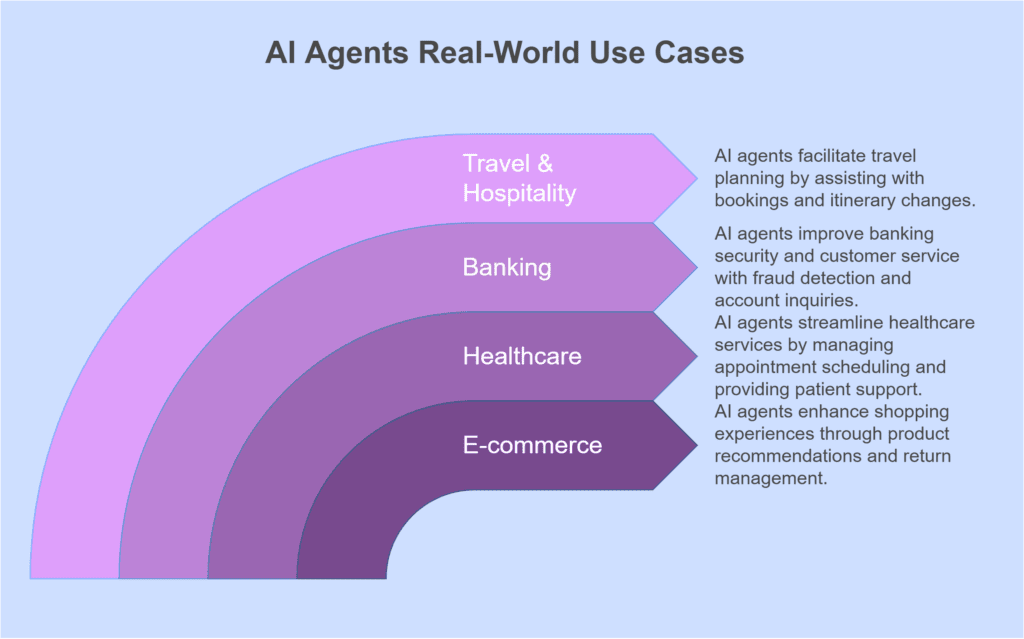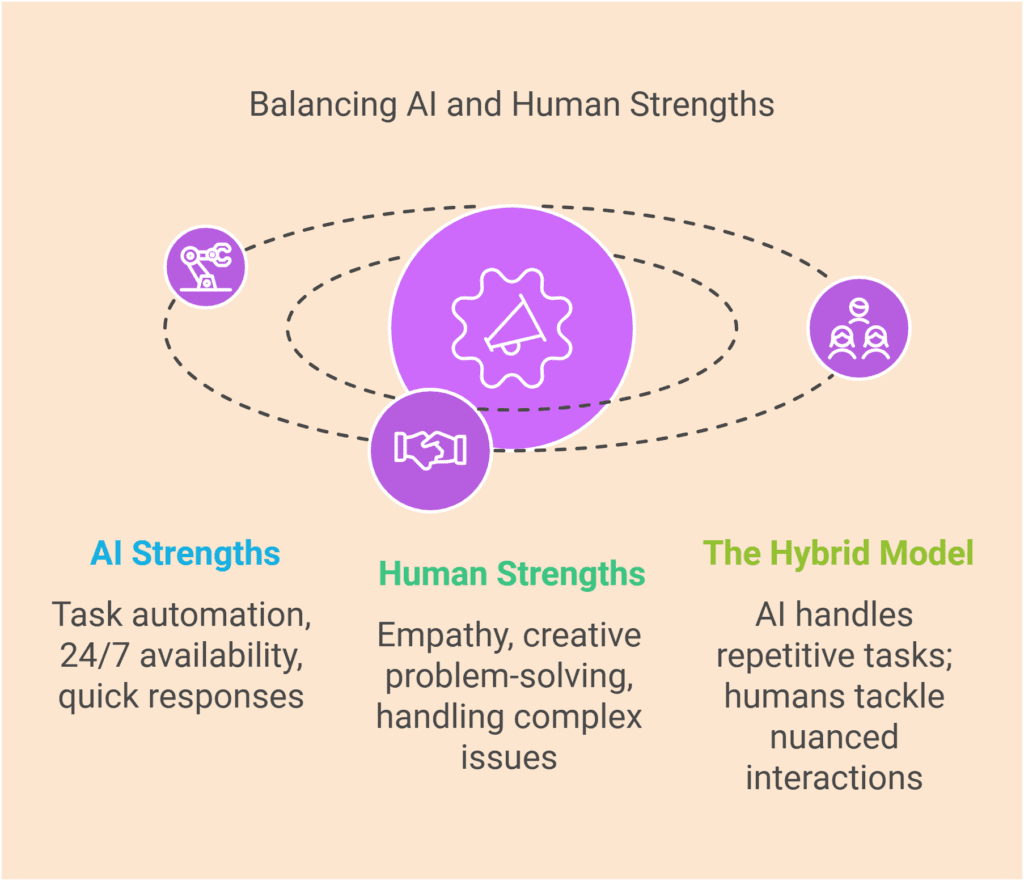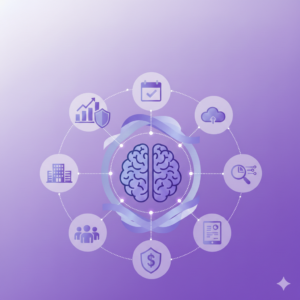The Rise of AI for Customer Service
10 Dec 2024 By: Maria Rush
Updated
AI for customer service is revolutionizing the customer-business interaction, thus improving customer satisfaction. It takes over the mundane tasks and provides quick, tailor-made support. The AI-powered systems bring about a radical change in the customer service area, replacing it with a smooth and technology-driven experience. AI agents are the main facilitators of this transition. They rely on AI and instantaneous problem-solving to cater to consumer requirements quicker and more effectively than before.

Understanding AI Agents in Customer Service
AI agents are software tools built to interact with customers. They answer questions, solve problems, and offer support, automating many traditional customer agent responsibilities such as handling FAQs, tracking orders, and managing basic troubleshooting. Unlike basic chatbots, AI agents use advanced artificial intelligence. This lets them understand natural language, plan actions, and complete tasks on their own. To fully leverage the potential of AI agents, businesses can collaborate with an experienced AI agent development company to implement customized, intelligent solutions that align with their customer service goals.
What is AI Agents and Their Role?
AI agents operate on websites, mobile apps, and social media. They handle inquiries efficiently, from basic FAQs to complex problems, offering quick support.
AI agents, in addition to providing quick replies, also record the customer interactions data. This data along with the revenue intelligence shows trends, preferences, and places to sharpen. They remain efficient and adjust to the customers’ insights, thus upgrading the service quality.
Trending Now: The 6 Core Functions of AI Agents
Jordan Wilson, host of the Everyday AI podcast, outlined six key functions that set AI agents apart from traditional tools like chatbots:
- Natural Language Processing (NLP)
- AI agents are powered by large language models, enabling them to understand and generate human-like responses in natural language.
- Tool Interaction
- AI agents can connect with external tools, such as CRMs, databases, and APIs, to perform tasks beyond basic conversation.
- Planning and Decision-Making
- Equipped with reasoning capabilities, AI agents plan multi-step workflows and execute complex tasks autonomously.
- Memory and Data Access
- They can access real-time and historical data, enabling personalized and contextually accurate responses.
- Task Execution
- AI agents don’t just provide insights. They actively perform tasks, such as processing refunds, scheduling appointments, or updating records.
- Learning and Adaptation
- AI agents learn from interactions, improving their performance over time to better meet customer needs.
These core functions make AI agents vital for businesses, automating workflows and enhancing personalization in ai for customer service.
The Evolution of AI in Customer Service
The role of AI in customer support began with basic programs that often frustrated users. Over time, advancements in machine learning and natural language processing (NLP) have significantly improved these systems, enhancing their ability to understand context and intent.
Moreover, integrations with voice recognition and sentiment analysis have revolutionized AI agents, enabling them to:
- Assist hands-free through voice activation.
- Gauge customer emotions during interactions.
These capabilities allow AI agents to provide tailored responses that resonate with users, ultimately leading to higher satisfaction rates.
What are the Benefits of AI Agents in Customer Service?

AI agents bring numerous advantages to businesses, transforming the role of AI for customer service operates. According to Fantasy.ai, by 2025, 19 out of 20 customer interactions will involve AI, and these AI Agents use cases highlight their growing role in managing complex workflows, automating routine tasks, and scaling support efficiently:
- Increased Efficiency and Productivity
- AI agents work 24/7, managing inquiries around the clock without breaks or downtime.
- They handle multiple queries simultaneously, reducing wait times and optimizing labor costs.
- 24/7 Customer Support
- AI agents provide immediate assistance, ensuring customers receive help anytime, anywhere.
- They triage inquiries, resolving simple ones autonomously and directing complex issues to human agents.
- Personalized Customer Experience
- AI agents analyze customer data to deliver tailored solutions, fostering loyalty and enhancing satisfaction.
- They learn from past interactions, continuously improving their responses and anticipating customer needs.
AI Solutions Transforming Businesses of All Sizes
Tech giants are driving the adoption of AI agents, demonstrating their potential for businesses of all sizes:
- Microsoft introduced Copilot Studio, allowing businesses to create customizable AI agents.
- Salesforce launched AgentForce, showcasing the seamless integration of AI agents with CRM systems.
- OpenAI is advancing agentic models capable of reasoning and executing tasks autonomously.
While these innovations are shaping the future, AI agents are no longer exclusive to large enterprises. Smaller businesses and BPOs are also leveraging advanced AI solutions like Hue to transform their operations.
Hue, powered by ChatGPT, revolutionizes customer interactions by delivering instant, accurate answers sourced from data such as websites, knowledge bases, and support documents. It blends AI efficiency with human oversight, seamlessly escalating complex queries to live agents when necessary.
Hue is a data powerhouse that can connect to any number of data sources, support SMS, social media, and other communication channels, and secure, compliant solutions customized for healthcare and finance. It has advanced features like intent screening, real-time updates, no-code setup, and personalized responses that help save time, lower operational costs, and improve customer satisfaction. Thus, making it perfect for all types of businesses.
What are the Challenges of Implementing AI Agents?
Despite their advantages, AI for customer service presents challenges that businesses must address:
- Overcoming Customer Resistance
- Some customers may prefer human interaction over AI.
- Offering seamless transitions between AI and human agents can build trust and ease concerns.
- Ensuring Data Privacy and Security
- AI agents handle sensitive customer information, making robust security measures essential.
- Transparency in data usage and compliance with regulations like GDPR are critical to maintaining customer trust.
Future Trends in AI for Customer Service
The future of AI for customer service is promising, with emerging trends enhancing its impact:
- Predictive AI for Proactive Service
- AI agents analyze customer behavior to anticipate needs, addressing issues before they arise.
- Proactive service fosters loyalty and strengthens customer relationships.
- Omnichannel Support
- AI agents provide consistent support across multiple platforms, ensuring seamless customer experiences.
- They track interactions across channels, personalizing responses based on past conversations.
Balancing Human and AI Interaction

AI agents are not only efficient but also scalable in customer service, as indicated here, yet they cannot substitute human empathy. Emotional problems, grievances, and intricate necessities still need males to deal, no matter how advanced AI tools get. The customers are the ones who need compassion, reassurance, and genuine understanding, and that is why generative AI cannot completely replicate them.
The optimal solution is a hybrid method that integrates AI agents and human supervision. AI agents take care of the monotonous tasks such as answering frequently asked questions, processing orders, and classifying inquiries. In cases that are difficult or sensitive to the point that empathy and creative problem-solving are necessary, human agents come into the picture.
This collaboration creates a balance. AI agents free human representatives from repetitive work. AI is giving human agents a hand by giving them access to real-time data, history, and insights that help them make better decisions. Organizations that want to create advanced AI agent solutions can cooperate with specialized firms such as EffectiveSoft to build tailored systems that will be perfectly integrated with the current customer service infrastructure.
Combining automation with human interaction in the customer service team ensures fast, efficient service without losing the emotional connection customers need. By using AI to enhance human efforts, businesses can deliver compassionate and cutting-edge role of AI in customer service that builds trust and loyalty. In many cases, ai development services help design systems where automation supports agents rather than replacing them, keeping interactions both efficient and human-centered.
Conclusion: Embracing AI for Customer Service
AI agents are transforming customer service, giving businesses a competitive edge in today’s fast-paced world. They automate repetitive tasks and deliver personalized experiences, freeing human agents to focus on high-value interactions.
“I don’t think we’ve kind of nailed the the right way to interact with these agent applications. I think a human in the loop is kind of still necessary because they’re not super reliable.”
— Harrison Chase, Founder of LangChain
Do you want to take your customer service to the next level by using AI? HelpSquad BPO is taking the first step towards introducing you to its great virtual assistant services and 24/7 customer support that are easy to use by your business. For only $8.50 per hour, our qualified bilingual agents will provide your business with fast and polite customer service which your clients need. The opportunity exists for you to enhance your customer interactions while boosting your business productivity. Start your trial with HelpSquad today and experience the difference.
What are AI agents in customer service?
AI agents are software tools that interact with customers to answer questions, solve problems, and complete tasks like order tracking, refunds, appointment scheduling, and basic troubleshooting. Unlike simple chatbots, AI agents use advanced AI to understand language, make decisions, and take action across systems.
How are AI agents different from traditional chatbots?
Traditional chatbots usually follow scripted flows and handle limited FAQs. AI agents can understand intent, access data, connect to tools (like CRMs and APIs), plan multi-step workflows, and complete tasks autonomously, making them more flexible and capable in real-world customer support.
How do AI agents improve efficiency and reduce wait times?
AI agents work 24/7, handle many conversations at once, and instantly respond to common questions. They can resolve simple issues immediately and triage complex cases to humans, which reduces queues and helps teams handle higher volume with fewer delays.
How do AI agents personalize customer service?
They use customer history and real-time data to tailor responses, like referencing past orders, preferences, or previous issues. Because they can retain context, AI agents can deliver more relevant help and smoother follow-ups, which improves customer satisfaction and loyalty.
What kinds of customer service tasks are best for AI agents to automate?
AI agents are strongest with repeatable workflows like FAQs, order updates, returns/refunds, appointment scheduling, account updates, and routing requests. They can also support agents by pulling data, summarizing context, and suggesting next steps.


